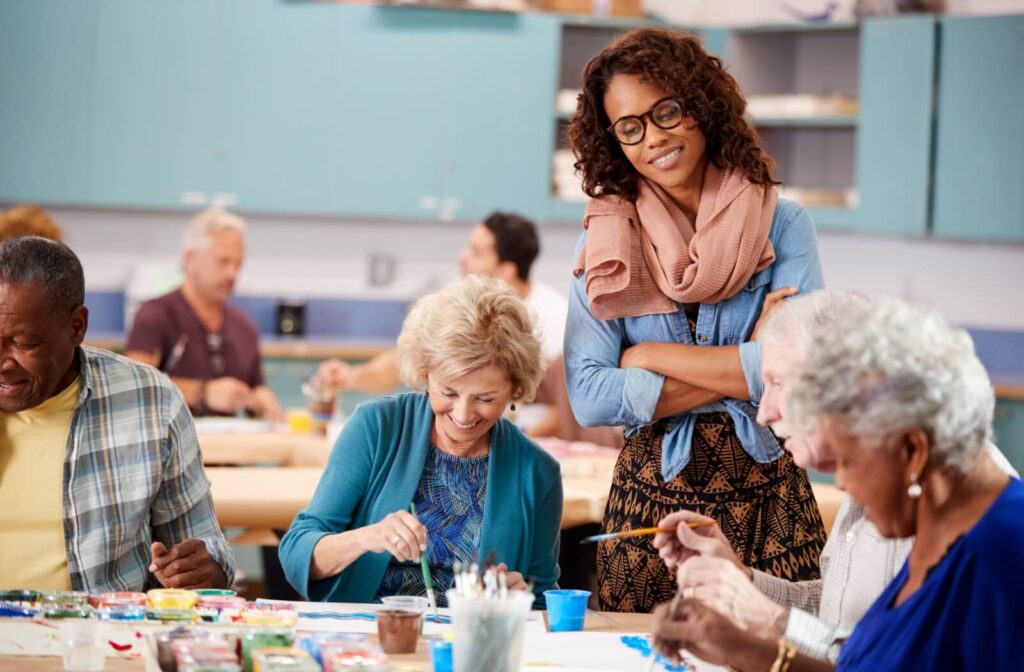Retirement marks the start of a new chapter in life. It’s a chance to slow down, reflect, and enjoy freedom after decades of hard work. But staying mentally active during retirement is more important than you might think. Research shows that maintaining cognitive engagement can help reduce the risk of dementia, improve memory, and provide a greater sense of fulfillment.
Lifelong learning opens the door to exciting opportunities for personal growth, creativity, and social connection in your golden years. There are so many ways for seniors to keep their minds sharp, including learning a new language, writing poetry, reading, playing games and puzzles, and regularly socializing, so you just have to pick the one that interests you most.
Why Cognitive Engagement Matters in Retirement
Cognitive engagement is vital for seniors to maintain mental sharpness and overall health. Here’s why staying mentally active matters as we age:
- Slowing Cognitive Decline: Regular mental stimulation strengthens neural pathways, which can delay the effects of dementia and memory loss.
- Boosting Mental Health: Learning something new fosters a sense of achievement and purpose, reducing feelings of isolation.
- Enhancing Quality of Life: Mental stimulation promotes problem-solving and critical thinking, improving confidence in daily activities.
Retirement isn’t a time to stop learning. On the contrary, it’s the perfect phase to expand your knowledge and stay sharper than ever.
What Is Lifelong Learning?
Lifelong learning refers to the ongoing pursuit of knowledge and skills throughout life. It goes beyond formal education and includes activities such as mastering hobbies, discovering new interests, or deepening existing knowledge.
For retirees, lifelong learning is empowering. It keeps the brain stimulated, fosters curiosity, and improves personal satisfaction. Whether it’s learning how to cook a new dish or exploring history through workshops, the joy of constant learning enriches day-to-day life.
How to Stay Mentally Active as You Age
Maintaining your mental acuity doesn’t have to be complicated. Here are some practical ways to keep your brain engaged in retirement:
- Keep Reading and Writing: Reading books, newspapers, or blogs exposes you to new ideas and keeps your mind active. Writing, whether journaling or storytelling, helps articulate thoughts, stimulates creativity, and improves memory.
- Play Brain-Boosting Games: Word puzzles, Sudoku, brain training apps, or memory games are enjoyable ways to challenge cognitive functions.
- Join Discussion Groups: Group discussions enhance communication skills and encourage new perspectives. Participate in book clubs or debates to keep your mind alert.
- Exercise Regularly: Physical activity promotes brain health by increasing blood flow and improving focus, memory, and problem-solving skills.
- Socialize: Connect with friends or family through shared experiences. Simple conversations or collaborative activities provide powerful mental stimulation.
New Skills Seniors Can Learn to Stay Mind Sharp
Retirement grants the time to learn hobbies and master new skills that stimulate cognitive function. Here are a few suggestions:
- Learn a New Language: Picking up a new language strengthens memory and sharpens mental focus. Apps like Duolingo or group lessons make it easier than ever to get started.
- Master a Musical Instrument: Learning to play the guitar, piano, or violin develops coordination and auditory memory while fostering a new creative outlet.
- Explore Knitting, Crocheting, or Cross-Stitching: These practical crafts improve hand-eye coordination, focus, and patience. Plus, they produce beautiful creations!
- Take Up Painting: Painting encourages self-expression, soothes the mind, and develops fine motor skills.
- Write Poetry or Stories: Creative writing ignites imagination, improves language skills, and offers a meaningful way to reflect on life’s experiences.
Explore one of these activities, or try several to find what interests you. The key is choosing something you enjoy that provides regular mental stimulation.
How Senior Living Supports Cognitive Health
Senior living communities go beyond providing care. They’re hubs of opportunity for mental stimulation. Here’s how senior living supports lifelong learning and cognitive health:
Engagement Through Activities
Residents can participate in book clubs, art classes, music lessons, or gardening workshops designed to stimulate the mind and boost creativity.
On-Site Educational Programs
Many senior living communities partner with local educators or organizations to offer lectures, skills workshops, or short courses tailored to retirees’ interests.
Access to Libraries & Technology
Communities often have libraries with books, digital resources, and tech tools that encourage residents to stay connected and continue learning.
Social Connection
Senior living promotes group learning activities, discussion events, and outings, offering the dual benefits of mental engagement and social interaction.
Encouragement from Staff & Peers
Residents receive support and encouragement to explore their interests. This inclusive, non-judgmental environment makes learning fun and fulfilling.
Educational Opportunities in Senior Living Communities

Senior living communities often provide tailored programs for their residents. Some examples include:
- Creative Arts Classes: Painting, crafting, and pottery workshops.
- Subject-Specific Lectures: Talks covering art history, politics, or science.
- Fitness and Wellness Sessions: Classes blending physical and mental stimulation, such as yoga or tai chi.
- Technology Workshops: Sessions on using tablets, smartphones, or social media effectively.
- Lifelong Learning Partnerships: Affiliations with universities or adult education institutes for continued learning opportunities.
Senior living communities help residents lead enriched, fulfilling lives by creating an environment that supports growth and exploration.
Take the First Step Toward Lifelong Learning
Saranac Village at Will Rogers advocates for all seniors to invest in lifelong learning during retirement, because it opens the door to endless benefits, from maintaining mental sharpness to gaining emotional satisfaction. Whether learning the soothing rhythms of a piano or holding lively discussions with fellow book lovers, there’s a world of opportunity waiting.
Contact us today to learn more about our educational programs and how we can support your loved one’s pursuit of growth and discovery.




